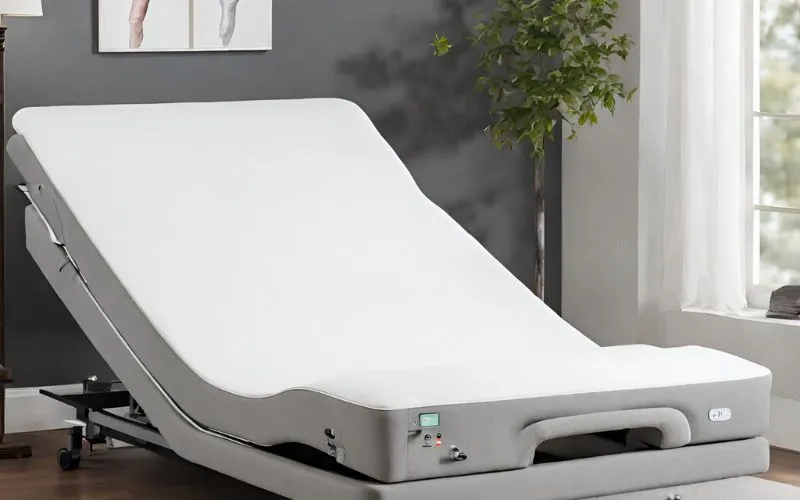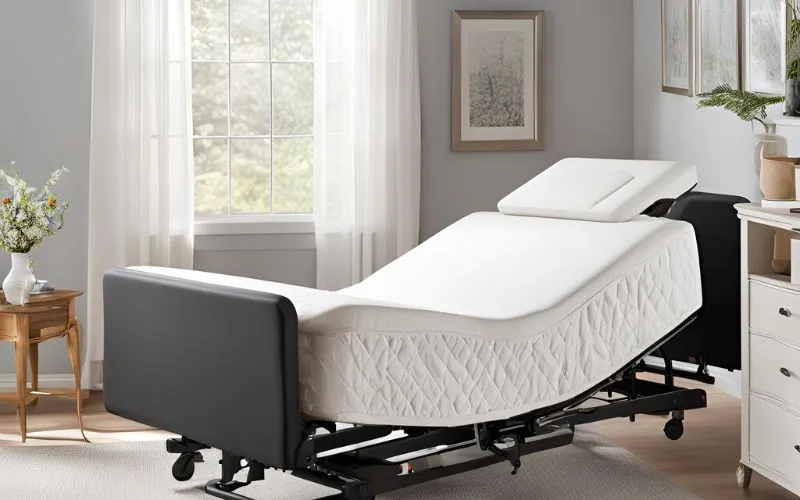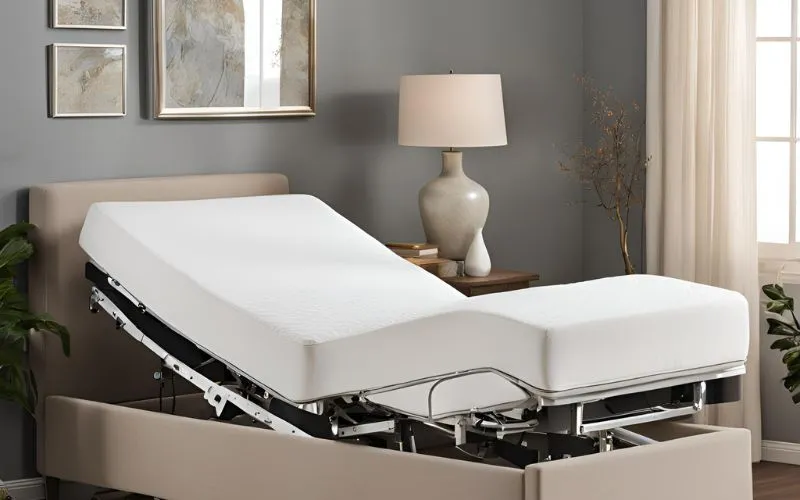Top Benefits of Adjustable Beds for Neurological Conditions

Introduction
Adjustable Beds for Neurological Conditions
Having a neurological condition can impact various aspects of daily life, including sleep quality, comfort, and overall well-being. In this article, we will explore the benefits of adjustable beds for individuals with neurological conditions, detailing their potential to enhance comfort, support proper sleep positioning, and improve overall sleep quality.
When dealing with neurological conditions, finding the right sleeping position and adequate support is crucial. Adjustable beds can provide personalized solutions to address the unique needs of individuals facing neurological challenges, offering customizable support and comfortable sleep environments.
Throughout this article, we will delve into the advantages of adjustable beds, the key features to consider when choosing one, and the positive impact these beds can have on sleep quality and overall health for individuals with neurological conditions.
Understanding Neurological Conditions
What Are Neurological Conditions?
Neurological conditions refer to disorders that affect the nervous system, including the brain, spinal cord, and nerves. These conditions can manifest in various ways, such as impaired movement, sensory issues, and sleep disturbances. Common neurological conditions include epilepsy, multiple sclerosis, Parkinson’s disease, and neuropathy.
- Neurological conditions can arise from genetic factors, environmental influences, or a combination of both.
- They may affect individuals of all ages, from infants to the elderly.
- These conditions often require a multidisciplinary approach to diagnosis and management, involving neurologists, physiotherapists, occupational therapists, and other healthcare professionals.
Types of Neurological Conditions
Neurological conditions encompass a wide range of disorders, each with its unique characteristics and impact on an individual’s daily life. These conditions can be categorized into movement disorders, degenerative diseases, inflammatory conditions, and structural abnormalities within the nervous system. Understanding the specific type of neurological condition is essential for tailoring effective support and care.
Impact of Neurological Conditions on Sleep
Neurological conditions can have a profound impact on an individual’s sleep patterns and overall quality of rest. The relationship between neurological conditions and sleep disturbances is complex and multifaceted, leading to various challenges that significantly affect an individual’s well-being.
- Insomnia: Individuals with neurological conditions often experience difficulty falling asleep or staying asleep, leading to chronic insomnia. The persistent lack of restorative sleep further compounds the symptoms of the underlying neurological condition, contributing to increased fatigue and cognitive impairment.
- Restless Legs Syndrome (RLS): RLS is a common neurological disorder characterized by uncomfortable sensations in the legs and an uncontrollable urge to move them, particularly at night. Individuals with neurological conditions may frequently experience RLS, which disrupts their ability to attain a restful sleep and hinders their overall sleep quality.
- Sleep Apnea: Neurological conditions can predispose individuals to sleep apnea, a potentially serious sleep disorder in which breathing repeatedly stops and starts during sleep. Sleep apnea not only further disrupts the sleep cycle but also poses significant health risks for individuals with neurological conditions, including heightened cardiovascular strain and cognitive impairment.
It is essential to recognize that disrupted sleep in individuals with neurological conditions can exacerbate other symptoms, such as pain, muscle stiffness, and cognitive dysfunction. Therefore, tailored sleep solutions are imperative to address these challenges and improve the overall quality of life for individuals managing neurological conditions.
Benefits of Adjustable Beds for Neurological Conditions
Customized Support and Comfort
Adjustable beds offer customized support and comfort, allowing individuals with neurological conditions to adjust the bed’s position based on their specific needs. Whether it’s elevating the head to alleviate breathing difficulties or raising the legs to promote circulation, the flexibility of adjustable beds supports personalized comfort and addresses individual sleep challenges.
Improved Sleep Quality
By facilitating personalized sleep positions and comfort settings, adjustable beds contribute to improved sleep quality for individuals with neurological conditions. The ability to find the most comfortable and supportive sleep position can alleviate discomfort, reduce pressure points, and promote relaxation, leading to enhanced overall sleep quality and better rest.
Enhanced Circulation and Reduced Pain
Enhanced Circulation and Reduced Pain
Adjustable beds can facilitate improved circulation and reduced pain for individuals with neurological conditions. Elevating specific parts of the body can aid in enhancing blood flow, alleviating pressure on affected areas, and reducing discomfort, thus contributing to better circulation and minimized pain levels during sleep.
Assistance with Positioning and Movement
Adjustable beds for neurological conditions offer invaluable assistance with positioning and movement, catering to the specific needs of individuals with mobility challenges. Here are some key points to consider:
- Enhanced Positioning: These beds provide the ability to adjust the sleeping surface to optimal positions, accommodating varying degrees of mobility limitations.
- Improved Mobility: By enabling smooth transitions between different resting positions, these beds promote greater ease of movement, reducing discomfort and promoting more dynamic sleeping postures.
- Customized Support: The flexibility of adjustable beds allows for tailored support, minimizing the risk of pressure ulcers and promoting proper spinal alignment.
- Pressure Relief: Specifically designed to alleviate pressure points, these beds enhance comfort and reduce the incidence of discomfort associated with prolonged bed rest.
Choosing the Right Adjustable Bed for Neurological Conditions
Key Features to Look for in an Adjustable Bed
When selecting an adjustable bed for neurological conditions, it’s important to consider a range of key features that can greatly impact the comfort and well-being of individuals with neurological conditions. Here are some essential features to look for when choosing an adjustable bed:
- Customizable Positioning: The bed should offer a wide range of positioning options to accommodate the unique needs of individuals with neurological conditions. This includes adjusting the head, foot, and overall bed height to achieve optimal comfort and support.
- Mattress Compatibility: Compatibility with specialized mattresses designed for neurological conditions is crucial. The bed should be able to accommodate various mattress types, such as pressure-relieving, memory foam, or air mattresses, to address specific comfort and medical needs.
- Ease of Use: User-friendly controls and interfaces are essential, particularly for individuals with limited mobility or dexterity. Intuitive remote controls, voice-activated commands, or smartphone apps can enhance the ease of adjusting the bed’s settings.
- Safety Features: Safety is paramount when selecting an adjustable bed for neurological conditions. Features such as anti-trap mechanisms, bed exit alarms, and sturdy handrails can provide added security and peace of mind.
Considerations for Different Neurological Conditions
When choosing an adjustable bed for individuals with neurological conditions, it is crucial to consider the specific needs and challenges associated with each condition. Tailoring the bed to address these considerations can significantly improve comfort, support, and overall well-being. Here are some key factors to consider for different neurological conditions:
- Multiple Sclerosis (MS)
- Mobility Challenges: Individuals with MS may experience mobility limitations, requiring an adjustable bed that facilitates easier movement in and out of bed.
- Pressure Relief: Proper pressure distribution is essential to prevent discomfort and skin breakdown, making pressure-relieving mattress options vital for individuals with MS.
- Support Requirements: Adjustable beds with customizable support levels can accommodate the varying needs of individuals with MS, offering optimal comfort and stability.
- Parkinson’s Disease
- Rest and Sleep Management: Individuals with Parkinson’s disease may benefit from adjustable beds that aid in finding comfortable sleeping positions and reducing nighttime movement challenges.
- Back Support:Proper spinal alignment and support are crucial for individuals with Parkinson’s, highlighting the importance of adjustable bed features that offer targeted back support.
- Enhanced Mobility: Beds with adjustable heights and tilting options can assist individuals with Parkinson’s in getting in and out of bed with greater ease.
- Stroke
- Recovery Support: Adjustable beds with responsive positioning can aid individuals during stroke recovery, providing comfortable and adjustable support for different stages of rehabilitation.
- Circulation Management:Optimal positioning features in adjustable beds can help improve circulation and alleviate pressure, supporting the recovery process for stroke survivors.
- Independence: Customizable bed controls can empower stroke survivors to adjust their sleeping and resting positions independently, promoting self-sufficiency.
By addressing these condition-specific considerations, an appropriately selected adjustable bed can contribute to enhanced comfort, improved mobility, and better overall quality of life for individuals with neurological conditions.
Consulting with Healthcare Professionals
When choosing an adjustable bed for neurological conditions, consulting with healthcare professionals is crucial to ensure that the bed meets the specific needs of the individual. Healthcare professionals, including physicians, physical therapists, and occupational therapists, play a vital role in providing valuable guidance and recommendations based on the individual’s condition and requirements. Here are some key points to consider when consulting with healthcare professionals:
- Physicians: Neurologists and other specialists can assess the individual’s neurological condition and advise on the optimal bed features to support comfort and safety during sleep.
- Physical Therapists: They can offer insights into the individual’s mobility limitations and suggest bed adjustments that promote better positioning and pressure relief.
- Occupational Therapists: These professionals can provide recommendations for adaptive equipment and assistive devices that complement the adjustable bed, enhancing overall comfort and accessibility.
Furthermore, healthcare professionals can address specific sleep-related challenges associated with neurological conditions and make informed recommendations for mattress firmness, support surfaces, and bed positioning. Their expertise and input are invaluable in selecting an appropriate and beneficial adjustable bed.
Conclusion
As illustrated, adjustable beds hold significant benefits for individuals with neurological conditions, encompassing customized support, improved sleep quality, enhanced circulation, and assistance with positioning and movement. By understanding the unique advantages these beds offer and considering the key features when choosing one, individuals and caregivers can make informed decisions to promote better comfort, sleep, and overall well-being.




